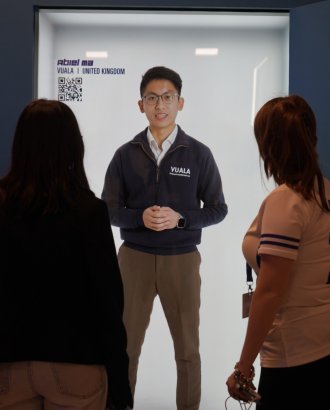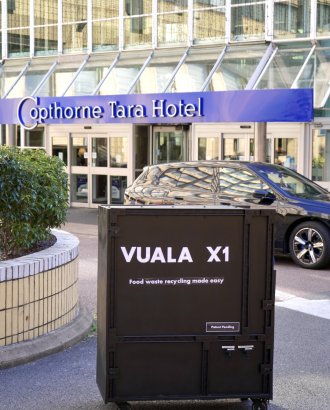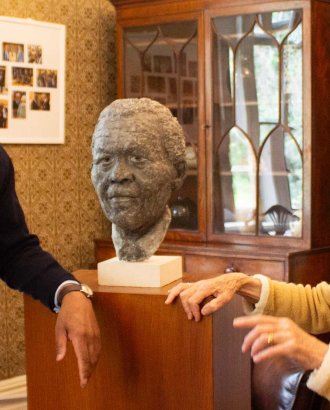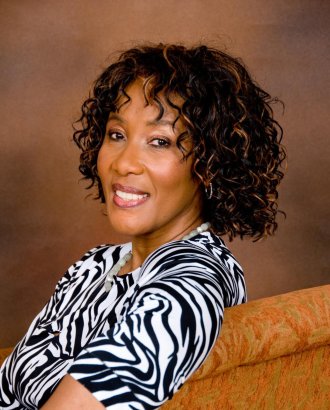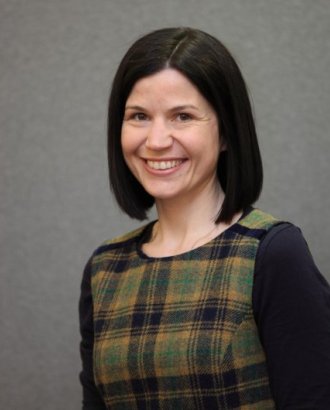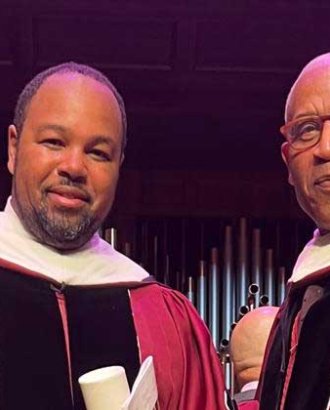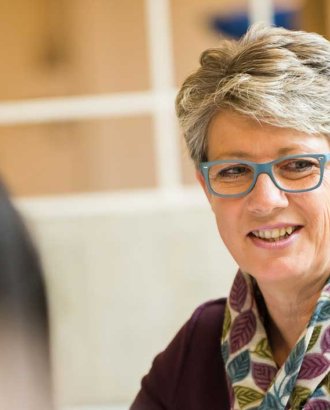ENTREPRENEUR AND Homerton alumni Abiel Ma is on a mission to deal with food waste and turn it into power.
His dream of helping companies recycle their leftovers has not only led him to launch a thriving start-up but also to spread his message to the world.
The 25-year-old, whose business journey began with Homerton’s ChangeMakers, shared his passion with delegates at the United Nations COP28 global climate change conference last month.
“It was a weird experience, I appeared as a Hologram”, Abiel said, referring to a digital version of himself giving a talk about food waste which was beamed to delegates visiting the UNICEF pavilion at the conference.
After giving his presentation in the flesh on a one-day visit to Dubai, his digital self stayed around to deliver his message to governments, non-governmental organisations and businesses for the remainder of the two-week gathering.
Abiel, who completed a Masters in entrepreneurship at Homerton in 2021, turned his attention to food waste after a visit to Rajasthan, India, in 2017 to research manufacturing processes.
“This was the first time I saw a landfill site, and I saw kids standing on the landfill sorting waste by hand. It was an unreal yet very real situation”, he said.
Stopping the car to observe the scene, he grew determined to do something about food waste.
The UK throws away 9.5 million tonnes of food every year, the weight of 800,000 double-decker buses.
Yet just one tonne of food waste can be turned into enough power to supply 100 homes for a day. The amount society throws away annually is enough to power every home in Cambridge for 30 years.
“In this energy crisis we’re in right now, organic waste can produce a lot of energy and we’re not using it. We’re sending it to landfill; I find that ridiculous”, Abiel said.
He turned to his father, Anthony, then head of research and development for an institute in Hong Kong, and a PhD-qualified chemical engineer. He invented an “artificial stomach” that separates food from other waste and digests it to produce a liquid used to generate power.
Abiel joined forces with his father to form the company Vuala to manufacture and promote these stomachs. After just two years, the start-up now has nine employees and machines at 40 sites, with clients that include Heathrow airport and Chelsea Football Club.
The key to success, Abiel admitted, was not necessarily helping to save the world from environmental catastrophe but was instead the bottom-line. This machine saves businesses money.
Instead of paying for regular expensive food collections and labour-intensive separating of food from other waste, their staff could simply throw a plastic bag into the Vuala machine, and it would do the rest using a macrobiotic process to digest the food.
Because the food is digested it no longer smells, and so can be stored much longer, which save on the cost of regular collections as well as fuel used in transportation.
Abiel said food in his machine can stay there for six months without smelling, but his contracts normally involve monthly collections. As the machine can tell how much waste it has, it will send a message if there needs to be a quicker collection.
It also provides information to the client on what type of food waste they are throwing away, such as too many carbohydrates or vegetables, so the client can adjust what they order to minimise waste.
“Cost-saving is the most important part”, Abiel says. “Few people want to think about food waste. It’s a messy problem, it’s disgusting! And once its’ been mixed with other waste, like metal or plastic, it makes everything impossible to recycle.
“That’s why we designed a machine that does everything automatically. Just put a whole bag of waste in and the food comes out one side, and other waste from the other side.”
At Homerton, Abiel studied the problem and then joined the ChangeMakers programme and received his first grant. “Without ChangeMakers there probably wouldn’t be a company, or maybe two years later. They gave me the courage to start at the very beginning.
“I also had talks with our Principal, Lord Woolley, and he helped a lot. I’m still very close to ChangeMakers and I’m giving a workshop at the same one that I took part in as a student.”
Abiel believes that technology and innovation hold the key to dealing with the waste problem. Hand-sorting waste does not make economic sense, he added.
“At COP28, I said we cannot ignore the issue because its’ dirty and smelly. We have to see it as an alternative source of energy.”
Abiel has spread his message to the British government. He visited 10 Downing Street last November with ChangeMakers, and stayed behind for detailed discussions with officials.
His message to young entrepreneurs was to not be afraid of failure. “I’m still learning day-by-day but obviously there were a lot of mistakes.
“But we need to support young entrepreneurs. It is very important; it is literally investing in the future.”
